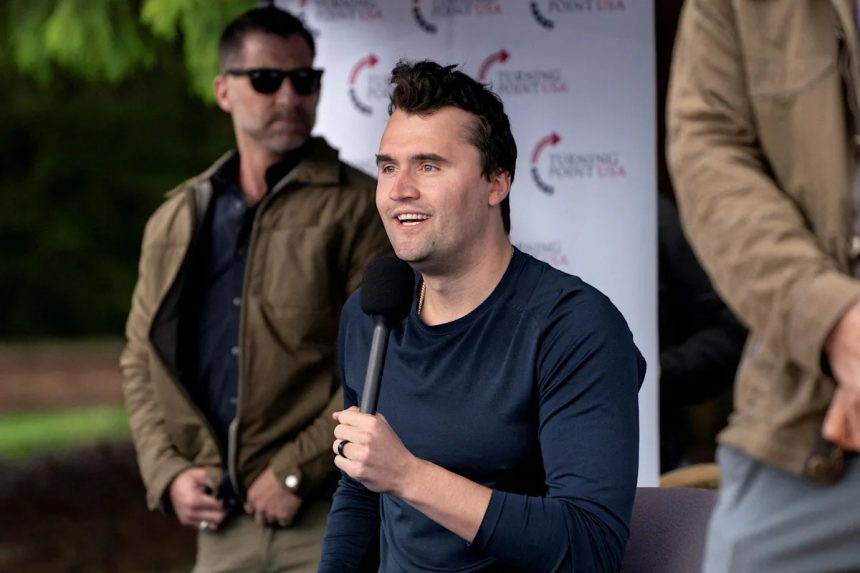Utah Gov. Spencer Cox called on Americans to turn the tide on political violence and build a culture that embraces dialogue and differences in the aftermath of conservative activist Charlie Kirk’s assassination.
The small but growing non-profit called Arizona Talks is pursuing that ideal, hosting public events on controversial topics but with an eye toward civility and unity. Experts who track and collect data on what issues Arizonans care about say the group and others like it could be a model for civil discourse and societal problem-solving.
Cox on Sept. 12 said Kirk’s slaying, which occurred as he debated college students on campus in Orem, Utah, with his organization Turning Point USA, represented an attack on core American values, making it “more difficult for people to feel like they can share their ideas, that they can speak freely.”
“We will never be able to solve all the other problems … if we can’t have a clash of ideas safely and securely. Even, especially, those ideas with which you disagree. That’s why this matters so much,” Cox, a Republican, said.
He pleaded for moral clarity, urging the youngest generations to recognize, “Words are not violence; violence is violence. There is one person responsible for what happened here … and yet all of us have an opportunity right now to do something different.”
Cox’s pleas for civil discourse come as the United States experiences a series of violent political attacks on both Republicans and Democrats. Before Kirk, there was the assassination of Minnesota lawmaker Melissa Hortman, an attempted assassination of President Donald Trump, the Jan. 6 riot at the U.S. Capitol that resulted in multiple deaths, including police officers, and the conspiracy to kidnap Michigan Gov. Gretchen Whitmer.
Charlie Kirk memorial and burial: What we know about the Turning Point USA founder’s funeral
The accumulation of violence has spurred different responses from the nation’s top leaders: Trump has blamed the “radical left,” calling it a one-side problem — despite a National Institute of Justice study showing “far-right attacks” outpace “all other types of terrorism and domestic violent extremism.” That study, which echoed findings from a report by the libertarian Cato Institute, was previously listed on the Department of Justice’s website but was removed after Kirk’s assassination.
Former presidents have urged an end to the violence, with Barack Obama saying the country is at an “inflection point.”
In Arizona, 35-year-old Carlos Alfaro thinks he has a solution: host civil conversations on touchy subjects in fun places, open to the public.
“We’re attracting a lot of those people that want back that lecture style, that discussion-style culture,” he said.
Turning Point USA founder and conservative commentator Charlie Kirk holds a debate event ahead of his scheduled speech on the campus of the University of Washington near a protest encampment in support of Palestinians, during the ongoing conflict between Israel and the Palestinian Islamist group Hamas, in Seattle, Washington, on May 7, 2024.
Can expert lectures in bars improve civil discourse?
Alfaro launched Arizona Talks, a nonprofit, nonpartisan organization that hosts events in breweries, co-working spaces and art museums, to discuss pressing and often controversial subjects, like election integrity or immigration, in a public format.
The idea started when he was attending at Arizona State University. He joined the student Republicans group and began debating. When he graduated, he wanted to continue, so he started Arizona Talks.
The goal? “Engage minds, influence culture,” the organization’s online banner reads. The method? Take the topics discussed, or perhaps not discussed, at the family dinner table and host them in fun places where the public can easily engage. The events typically include a panel of experts and draw anywhere from dozens to a couple hundred attendees who pay roughly $10 to $30 dollar a ticket.
“After college, there’s just not enough of those opportunities,” Alfaro said.
His events don’t produce the type of snappy soundbites like those from Kirk’s Turning Point USA, where Kirk would would challenge college students to prove him wrong on hot-button issues in scenarios that regularly made for entertaining and viral social media videos.
Alfaro acknowledged that sort of competition exists and is intent on growing Arizona Talk’s social media presence, he said. The organization currently has 1,500 Instagram followers. But he’s anchored by three core tenets: the event should be “robust, fact-based and inclusive of all viewpoints. “
“There are speakers who have rejected this model because they want to hear a harder, more unbalanced conversation. They’re out to dunk on their neighbor … it’s important for us to negate that because we see it everyday on social media.”
He’s also focused on a particular audience: people who are “open, curious and humble enough to think they’re not the smartest in the room,” he said.
“But I don’t think because it’s not divisive, it won’t sell,” Alfaro said. “The desire to be involved and have a discussion is pretty much inherent in all of us, specifically in Americans. That’s how our country was made.”
Opinion: Charlie Kirk’s death should be a wake-up call for AZ to restore civil discourse
Turning Point’s events drew thousands, Alfaro said, “because they were great communicators. They’re still great organizers in bringing out their message and organizing people to bring more and more people together. … So it’s up to us to organize and do the same for unity.”
Alfaro pointed to groups like Lectures on Tap, where professors give lectures in bars in New York City, Chicago, Boston, Los Angeles and San Francisco. The group had 436,000 Instagram followers as of Sept. 17. He also mentioned Open To Debate, which has 275,000 Youtube subscribers.
Identifying areas of agreement key to progress
Sybil Francis, president and CEO of the Center for the Future of Arizona, said events like Arizona Talks can help bridge the gap on tricky questions of how to solve societal problems.
The Center surveys Arizonans about their civic priorities and aims to bring residents together by providing data that illuminates shared public values.
Some of that data has shown Arizonans overwhelmingly agree there is a need for more affordable housing in their communities, support comprehensive immigration reform that includes a pathway to citizenship and believe private schools receiving state funding should be held to the same standards as public ones.
What do Arizonans care about? Affordable housing and immigration reform, poll says
Identifying those areas of agreement is important, Francis said, to “give us hope, because I think if we truly were divided, then it’s not clear what the path forward could be. … Also, when we recognize what we share, I think it then becomes harder to villainize or dehumanize other people.”
Determining how to achieve those outcomes is harder, Francis acknowledged. But starting from a belief that we’re divided, when “we actually agree much more than we disagree,” only makes problem-solving harder, she said.
“I’m trying to tell a different story, which is that we’re not hopelessly divided. And I do believe that the story that you decide to go with is very impactful on how you think, how you feel and how you behave,” Francis said.
Taylor Seely is a First Amendment Reporting Fellow at The Arizona Republic / azcentral.com. Do you have a story about the government infringing on your First Amendment rights? Reach her at tseely@arizonarepublic.com or by phone at 480-476-6116.
Seely’s role is funded through a collaboration between the Freedom Forum and Journalism Funding Partners. Funders do not provide editorial input.
This article originally appeared on Arizona Republic: Arizona Talks seeks to better civil discourse after Charlie Kirk death









